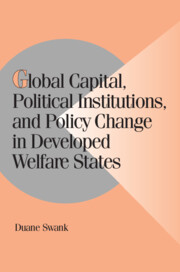Book contents
- Frontmatter
- Contents
- List of Figures and Tables
- Preface
- 1 INTRODUCTION
- 2 GLOBALIZATION, DEMOCRACY, AND THE WELFARE STATE
- 3 GLOBAL CAPITAL, POLITICAL INSTITUTIONS, AND CONTEMPORARY WELFARE STATE DEVELOPMENT: QUANTITATIVE ANALYSIS
- 4 BIG WELFARE STATES IN GLOBAL MARKETS: INTERNATIONALIZATION AND WELFARE STATE REFORM IN THE NORDIC SOCIAL DEMOCRACIES
- 5 GLOBALIZATION AND POLICY CHANGE IN CORPORATIST CONSERVATIVE WELFARE STATES
- 6 INTERNATIONALIZATION AND LIBERAL WELFARE STATES: A SYNOPSIS
- 7 ASSESSING LONG-TERM IMPACTS: THE EFFECT OF GLOBALIZATION ON TAXATION, INSTITUTIONS, AND CONTROL OF THE MACROECONOMY
- 8 CONCLUSIONS: NATIONAL WELFARE STATES IN A GLOBAL ECONOMY
- APPENDIX A Data Sources
- APPENDIX B Alternative Estimators
- References
- Index
- Titles in the series
6 - INTERNATIONALIZATION AND LIBERAL WELFARE STATES: A SYNOPSIS
Published online by Cambridge University Press: 13 January 2010
- Frontmatter
- Contents
- List of Figures and Tables
- Preface
- 1 INTRODUCTION
- 2 GLOBALIZATION, DEMOCRACY, AND THE WELFARE STATE
- 3 GLOBAL CAPITAL, POLITICAL INSTITUTIONS, AND CONTEMPORARY WELFARE STATE DEVELOPMENT: QUANTITATIVE ANALYSIS
- 4 BIG WELFARE STATES IN GLOBAL MARKETS: INTERNATIONALIZATION AND WELFARE STATE REFORM IN THE NORDIC SOCIAL DEMOCRACIES
- 5 GLOBALIZATION AND POLICY CHANGE IN CORPORATIST CONSERVATIVE WELFARE STATES
- 6 INTERNATIONALIZATION AND LIBERAL WELFARE STATES: A SYNOPSIS
- 7 ASSESSING LONG-TERM IMPACTS: THE EFFECT OF GLOBALIZATION ON TAXATION, INSTITUTIONS, AND CONTROL OF THE MACROECONOMY
- 8 CONCLUSIONS: NATIONAL WELFARE STATES IN A GLOBAL ECONOMY
- APPENDIX A Data Sources
- APPENDIX B Alternative Estimators
- References
- Index
- Titles in the series
Summary
The predominately liberal welfare states of Britain, North America, and Australasia are characterized by a mixture of moderate to low flat-rate, social insurance, and extensively means-tested benefits, as well as significant private social insurance and relatively small public commitments to government-provided social services. Comparative data presented in preceding chapters have highlighted these features of liberal welfare states, as well as their relatively modest impacts in ameliorating poverty and income inequalities. As I have also illustrated, programmatic features of some of these welfare states create significant departures from the liberal prototype. Most notably, Britain (especially prior to 1980) exhibits significant elements of universalism in program structure (especially through the National Health Service and flat-rate benefits based on citizenship). In addition, the Australian (and New Zealand) welfare state represents an interesting variation of the liberal model. Prior to the 1980s, low and heavily means-tested social benefits have been embedded in a state regulated system of relatively high minimum wages, protectionism for domestic industry, and progressive taxation (e.g., Castles [1996]; Castles and Mitchell [1993]). Although public social protection is modest, (pre-1980s) wage compression and full employment have combined with social welfare programs to create a “wage earners welfare state” (Castles, 1985).
In this chapter, I provide succinct case studies of contemporary social welfare policy change and the sources of that change in two liberal systems, the United States and Britain, and brief analyses of globalization, political institutions, and social welfare state reforms in Australia, Canada, and New Zealand.
- Type
- Chapter
- Information
- Global Capital, Political Institutions, and Policy Change in Developed Welfare States , pp. 218 - 242Publisher: Cambridge University PressPrint publication year: 2002



